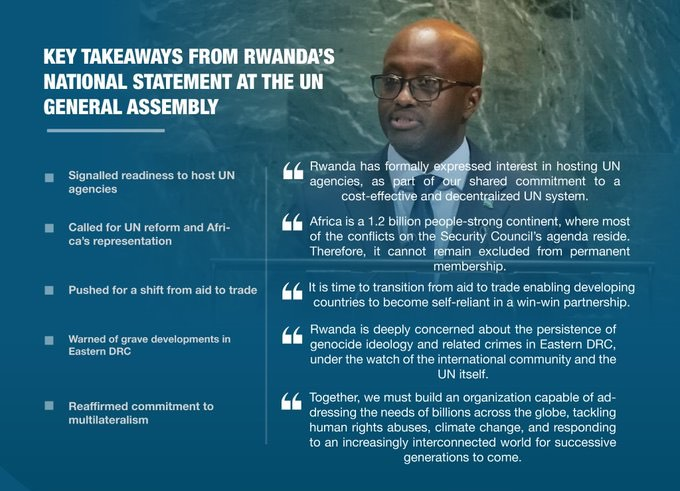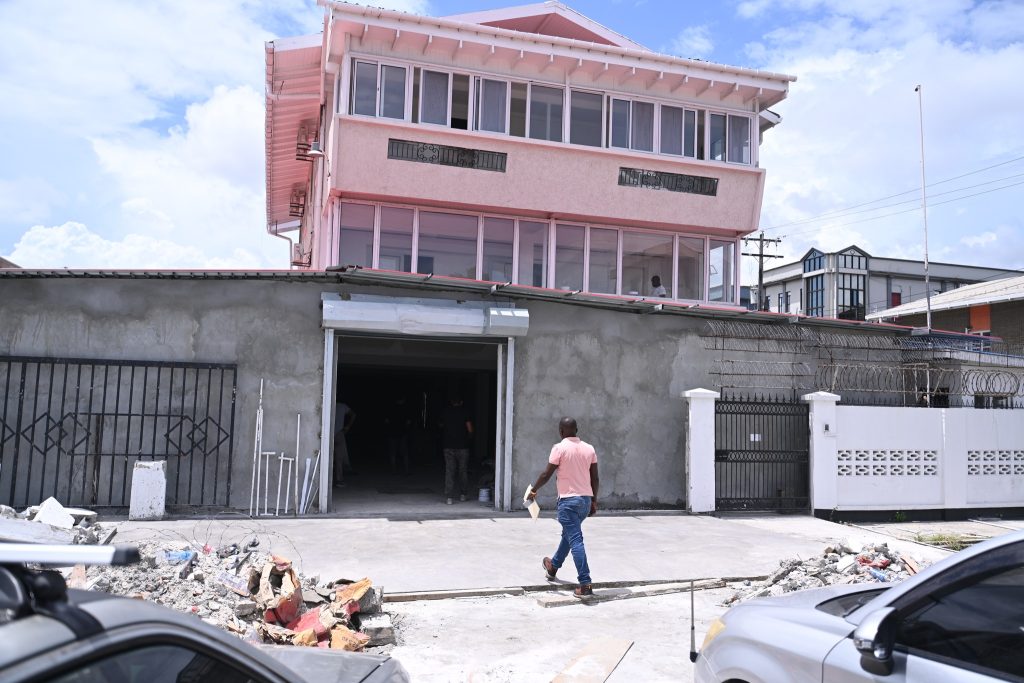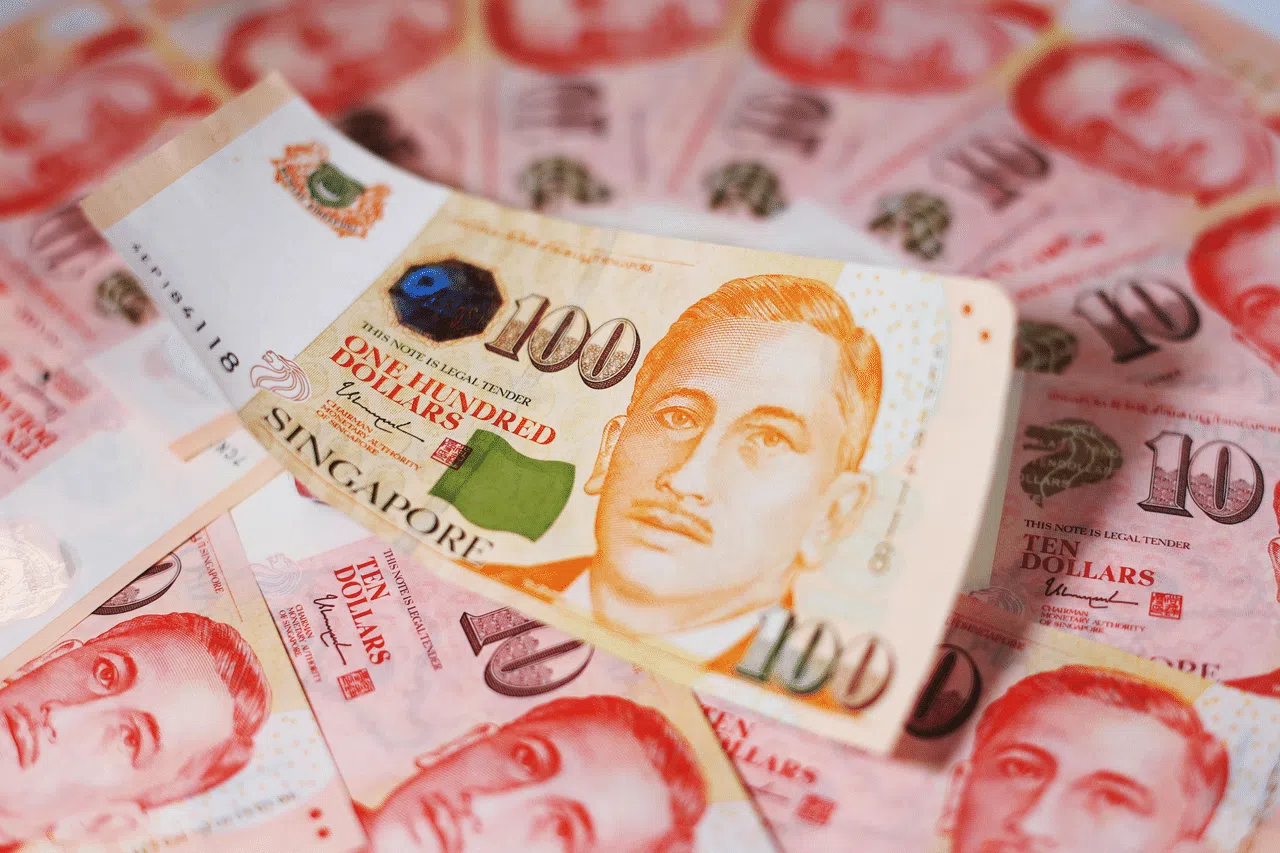Copyright rnanews

New York, 25 September, 2025: Your Excellency Annalena Baerbock, President of the 80th General Assembly; Your Excellency António Guterres, Secretary General of the United Nations; Excellencies Heads of Delegation; Ladies and Gentlemen; Good evening. Allow me to begin by congratulating Her Excellency Annalena Baerbock, on her election as President of the 80th Session of the United Nations General Assembly. I take this opportunity to thank His Excellency Philémon Yang, the outgoing President, for his work and dedicated service to multilateralism. Rwanda extends its gratitude to Secretary-General António Guterres for his comprehensive report on the work of the United Nations, aimed at improving its efficiency. In this regard, Rwanda has formally expressed interest in hosting UN agencies, as part of our shared commitment to a cost-effective and decentralized UN system. We reiterate our support to the work of the United Nations and the Secretary General, particularly in advancing peace and security, and drive progress on Sustainable Development Goals. Excellencies, This year, the United Nations turned eighty. This journey has not been without challenges. Fast-changing realities, including economic shocks, and the legitimate aspirations of regions long denied a voice, compel us to quickly adapt to make the UN fit-for-purpose. That is why, Rwanda strongly supports reforms, especially of the Security Council. The composition of this body does not reflect current realities. Africa is a 1.2 billion people-strong continent, where most of the conflicts on the Security Council’s agenda reside. Therefore, it cannot remain excluded from permanent membership. Excellencies, The United Nations development pillar remains central to advancing peace, prosperity, and dignity for all. We commend the UN development system and its partners for their tireless efforts in supporting countries to address pressing development challenges, from poverty eradication to climate resilience, and in driving forward the ambition of the 2030 Agenda. This 2030 Agenda for Sustainable Development embodies our collective aspiration for a just, inclusive, and prosperous world where no one is left behind. Rwanda remains firmly committed to its full implementation, recognizing that connectivity, innovation, and inclusive development are indispensable drivers of progress. Despite global challenges such as the existential threat of climate change and widening technological inequalities, Rwanda has taken bold steps to align national priorities with the SDGs. These efforts demonstrate that development, connectivity, and environmental stewardship can move forward hand in hand. Yet, the persistence of unequal access to finance, technology, and markets threatens to widen the gap between those with means and those without. In this context, solidarity among nations through development cooperation has contributed to bridging the development gaps. However, we believe that it is time to transition from aid to trade enabling developing countries to become self-reliant in a win-win partnership. Madam President, Excellencies, Rwanda regrets the politicization of development cooperation, which is used by some development partners for partisan political reasons and interests. Let me recall that every nation is sovereign and cannot be forced to choose between its security and development. Development aid must serve as a tool for solidarity and progress, not as a weapon of coercion. Excellencies, The history of the 1994 Genocide against the Tutsi in Rwanda called on us to become global advocates for a peacekeeping that always puts civilians first. We pay tribute to the men and women who have worn the blue helmet and who have paid the ultimate price in the service of humanity. Their legacy is written in the history of the United Nations and lives on through the lives they helped save. But peacekeeping must be judged by its results. For the sake of the millions who look to the UN for protection, we must ensure that peacekeeping remains true to its purpose. That is why Rwanda champions robust peacekeeping, the Responsibility to Protect, and the implementation of the 2015 Kigali Principles on the Protection of Civilians. Moreover, Rwanda has led calls for sustainable peace financing, both in Africa and globally. Among milestone achievements is the revitalization of the African Union Peace Fund, which now mobilizes over 400 million dollars. As a direct result, the Security Council decided to finance three-quarters of African Union peace operations for the first time. Madam President, Beyond the UN, Rwanda contributes to peace support operations on a bilateral basis in the Central African Republic and Mozambique, in an effort to promote South-South Cooperation and Pan-African solidarity. Major progress has been recorded in both countries in the restoration of state authority, capacity building of local security forces and the fight against terrorism. Excellencies, I may recall that the United Nations was established to spare succeeding generations from the scourge of war. Yet, eighty years on, conflicts continue to erupt across every continent. Rwanda firmly maintains that for most of those conflicts, lasting peace cannot be achieved through military means. We have consistently held that only genuine, good-faith dialogue offers a sustainable path toward global peace. However, peacekeeping alone is not enough. Too often, we deplore relapse into conflict because its root causes were not properly addressed. Prevention, mediation, and effective peacebuilding must be our first resort. This lesson is particularly urgent for the Great Lakes region of Africa. The current conflict in Eastern DRC is not new. It is rooted in decades of bad governance, marginalization and persecution of minorities, genocide ideology and a persistent colonial legacy. Rwanda believes that peace in Eastern DRC is in everyone’s best interest. Our goal has always been—and will remain—the security and wellbeing of Rwandans, and the people of our region. In June this year, Rwanda and the DRC signed a peace agreement in Washington. It provides for a comprehensive framework encompassing security, political, and economic components. This achievement was made possible thanks to the strong leadership of His Excellency President Donald Trump of the United States, and of His Highness Sheikh Tamim bin Hamad Al Thani, Emir of the State of Qatar, whose vision for peace and prosperity in our region, Rwanda fully shares. We also acknowledge the vital role played by African-led initiatives, notably the joint EAC-SADC process, supported by the African Union mediation, for their efforts in favor of peace. Nevertheless, since the signing of this peace agreement, progress has been moving slowly. While promising meetings are taking place in Washington to implement the June Peace Agreement, the situation on the ground remains deeply troubling. The DRC’s renewed militarization, coupled with its continued collaboration with genocidal and UN sanctioned armed groups such as the DRC-backed FDLR and Wazalendo militias, and the deployment of attack drones and fighter jets against civilian populations, particularly the Banyamulenge and other Congolese Tutsi, underscore the gravity of the crisis. This goes against the letter and spirit of the Washington Peace Agreement. Additionally, this coalition is supported by foreign forces, including mercenaries, in clear violation of the 1977 OAU Convention and the 1989 UN Convention against the use of mercenaries. Rwanda condemns these developments and calls on the DRC to reject the military solution and implement in good faith the Washington Peace Agreement which is a golden opportunity to end this conflict that has lasted for far too long. Excellencies, Since 1999, the United Nations has maintained a robustly mandated peacekeeping mission in the Democratic Republic of the Congo (MONUSCO) to help address the conflict. Yet, despite its efforts, the mission has not succeeded in halting the proliferation of armed groups, especially the eradication of the DRC-backed FDLR. Instead, MONUSCO has ended up working alongside a military coalition that includes the FDLR, going against more than twenty Security Council resolutions calling for the neutralization of that group. There is an urgent need to review the legal conformity of MONUSCO’s mandate. Of particular concern to Rwanda is the emergence of Wazalendo militias, armed and supported by the DRC Government, which are committing countless abuses, including burning down a whole villages of Congolose Tutsi, lynching and burning alive civilians and military officers, as well as arming children for ethnic cleansing. Their brutality, methods and ideology bear an alarming resemblance to that of the genocidal militias of 1994 in Rwanda. Strong action is needed to put an end to this dangerous development before it is too late. Excellencies, Human rights are a major pillar of the United Nations. Rwanda rose from the ashes of the Genocide in 1994 by placing human dignity, unity, and accountability at the center of our governance. We thank the United Nations for establishing the International Day of Reflection on the 1994 Genocide against the Tutsi, commemorated every April 7th. We also thank the Secretariat and the many Member States who have established genocide memorials on their soil, as a lasting pledge to never forget. Equally, we commend the work of the International Criminal Tribunal for Rwanda, and the Residual Mechanism, for prosecuting genocide perpetrators. However, Rwanda is deeply concerned about the persistence of genocide ideology and related crimes in Eastern DRC, under the watch of the international community and the UN itself. We call on the international community to not turn a blind eye, once more, for what is clear to see. The targeting, persecution, and massacre of Congolese Tutsi, including the Banyamulenge community, amounts to crimes against humanity which have all the early warning signs of a Genocide. Indeed, Genocide follows a pattern. It follows clear stages. It is not an umbrella term; it is defined by international law. Genocide targets a specific group for who they are, with the intent to exterminate them as such. In this regard, no amount of calculated cynicism can rewrite the truth and recast perpetrators as victims, or victims as perpetrators. These are denialist behaviors often deployed by perpetrators. In the same vein, no claims from a government arming a genocidal militia will change the facts of history. Financing and providing weapons to a group with a proven genocidal record and ongoing intent is nothing less than complicity in the crime itself. I must say that if there are crimes in the DRC committed for economic gains, they have clear names: Those are corruption, bad governance, and the embezzlement of public funds. Madam President, Excellencies, I wish to conclude by reaffirming that Rwanda stands ready to work alongside all Member States to ensure that the United Nations remains a force for peace, justice, and sustainable development. While the challenges and solutions for multilateralism are clear, it is political will that must guide us today to build a UN fit for purpose. Together, we must build an organization capable of addressing the needs of billions across the globe, tackling human rights abuses, climate change, and responding to an increasingly interconnected world for successive generations to come. I thank you. (End)



